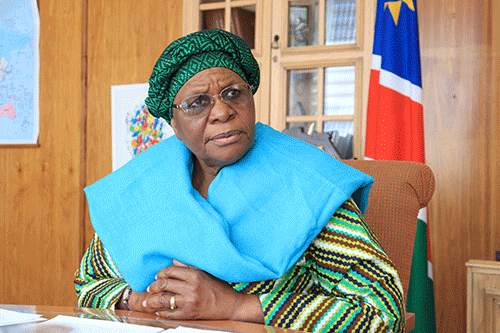Namibia stands on the cusp of a historic moment as Vice President Netumbo Nandi-Ndaitwah bids to become the nation’s first female president in Wednesday’s election.
If successful, she would join the ranks of other trailblazing African women leaders, including Liberia’s Ellen Johnson Sirleaf and Malawi’s Joyce Banda.
With at least 1.4 million registered voters — nearly half the population — 15 political parties are vying for the presidency and National Assembly seats.
Among them, Nandi-Ndaitwah and her party, the South West Africa People’s Organization (SWAPO), appear poised to lead, according to preliminary results from special early polls.
These polls, conducted among foreign missions, seamen, and security forces, place SWAPO ahead in the race.

Challenges of Legacy and Governance
SWAPO, which has governed Namibia since its independence from South Africa’s apartheid regime in 1990, faces a tough electoral climate. The party’s grip on power weakened significantly in 2019 when it lost its two-thirds majority in the National Assembly — a first since 1994.
Public disillusionment stemmed largely from allegations of corruption and money laundering tied to the country’s fishing industry. Two cabinet ministers were implicated, alongside business figures who faced conviction and imprisonment.
Political analyst Henning Melber, a professor affiliated with South African universities, suggests that SWAPO’s dominance may never fully recover. “It looks like there is no way back to regain such dominance. The process of erosion of legitimacy as a former liberation movement has advanced too much,” he remarked.
Melber also emphasized the significance of younger voters, known as “born-frees,” who were born after Namibia’s liberation. Unlike older generations, this demographic is less likely to vote based on emotional ties to SWAPO’s liberation history. Instead, they focus on governance and delivery.
Nandi-Ndaitwah’s Vision: Jobs and Inclusion
At 72, Nandi-Ndaitwah promised bold reforms to address Namibia’s pressing issues, particularly unemployment. Youth unemployment stands at 20%, and her pledge to create over 500,000 jobs within five years — requiring an ambitious $4.7 billion investment — has drawn both support and skepticism.
Critics have labeled the plan overly optimistic, but her message resonates with voters eager for change.
Women’s issues, including reproductive rights, equal pay, and access to healthcare, are also anticipated to feature prominently on the political agenda.
Erika Thomas, a political science lecturer at the University of Namibia, highlighted the importance of inclusivity in governance. “She must also try to push for policies and legislative frameworks for women participation and to bring more women into the political structures,” Thomas stated.
A Changing Southern Africa
Namibia’s election is part of a broader wave of political shifts in southern Africa this year. In South Africa, the African National Congress (ANC) lost its 30-year parliamentary majority, and Botswana’s Democratic Party was unseated after 58 years in power. Mauritius also saw a landslide opposition victory, while disputed elections in Mozambique have sparked deadly protests, leaving at least 30 dead.
Closer to home, SWAPO faces stiff competition from newer parties such as the Independent Patriots for Change, led by former dentist Panduleni Itula, and the Affirmative Repositioning party, headed by university professor Job Amupanda. Both parties are courting the youthful electorate disenchanted with SWAPO’s track record.
The stakes are high, and Nandi-Ndaitwah’s potential presidency carries both symbolic and practical implications. Her leadership could not only break barriers for women but also reshape Namibia’s political trajectory. However, her promises of transparency, accountability, and job creation will be crucial in determining whether she can meet the expectations of a diverse and demanding electorate.
As Namibia heads to the polls, the world watches to see whether the nation will embrace this historic change, marking a new chapter in its democratic journey.
READ ALSO: Martin Amidu Criticizes Political Exploitation of Bawku Conflict




















